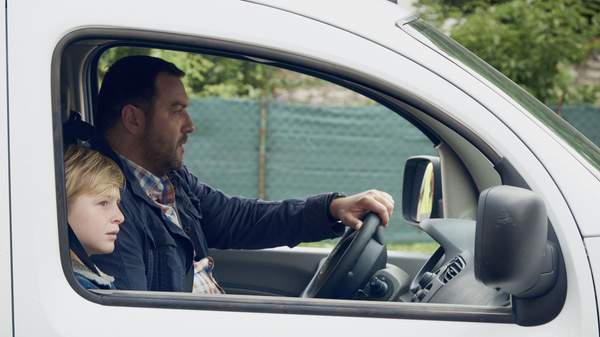Overview
UPDATE, September 14, 2020: Custody is available to stream via SBS On Demand, Google Play, YouTube Movies and iTunes.
If Kramer vs. Kramer met The Shining, it would look like Custody. That's filmmaker Xavier Legrand's own description of his bleak and tough domestic thriller, and it's one that firmly fits. The French writer-director initially styles his debut movie as a social realist drama, following a divorcing couple fighting over their 11-year-old son. But as courtroom arguments give way to the family's daily reality, Custody understands the devastating terror that comes from living in fear. As strained civility is replaced by deep-seeded turmoil, the film turns the trauma of a dissolving marriage and the accompanying fallout into an unwavering portrait of horror.
Everyone in Custody is afraid of something and, crucially, they know it. Anxiety overwhelms the movie, with Legrand mirroring the Besson family's shattered nerves in the film's relentless mood. Miriam (Léa Drucker) is clearly frightened of her husband Antoine (Denis Ménochet), who she has left suddenly with their two children in tow. The duo's pre-teen son Julien (Thomas Gioria) and nearly 18-year-old daughter Joséphine (Mathilde Auneveux) share her concern, although Julien is also worried that he can't protect his mother from his father. An imposing figure even when he's attempting to be calm, Antoine can't face the lack of control and power that comes with his new situation. Panicked anguish and agitation radiates from his pores, gaze and stance, turning every gesture into an act of hostility.
After spending its first 15 minutes scrutinising Miriam and Antoine's court battle — she claims that he's violent, he says that she has turned their kids against him — Custody charts the aftermath of the judge's decision. Julien must stay with Antoine on alternating weekends, but the boy visibly doesn't want to go. Dread and distress build with each scene, as Julien tries to stay composed while Antoine's thin facade of restraint just keeps cracking. Every moment is weaponised, be it a hug where Julien remains blank-faced and limp, a tussle over the kid's mobile phone, Antoine's bullying determination to find out where Miriam and the children are living, or the man's overbearing behaviour when he arrives unannounced on more than one occasion.
Following the same characters first seen in his Oscar-nominated short Just Before Losing Everything, Legrand canvasses the whole family's reactions and perspectives — but Julien remains the film's quivering heart. In a masterstroke of casting, first-time actor Gioria conveys the internalised pain and stress of being literally caught in the middle of a parental tug-of-war. More than that, even when he's keeping silent, he shows how terror shapes Julien's entire existence. As a result, the boy's time with Ménochet is impossible to look away from, even though it's crafted to evoke maximum discomfort. Meanwhile, the disarmingly naturalistic Ménochet never plays Antoine as a simplistic villain, although he's always a threat. Legrand purposefully cast someone who physically fills the frame, and constantly uses the hulking talent to push his other stars to the edge of the image.
Indeed, it's Legrand's visual approach — particularly in his depiction of his menacing antagonist — that speaks to his film's true brilliance. The director doesn't merely want to tell a brutal tale about divorce, fear and violence. He doesn't just want his actors to express their characters' complex emotions with each breath and blink, either. And he doesn't simply want to chronicle the destruction that springs from domestic abuse, although that's one of his aims. Rather, the filmmaker is intent on trapping viewers in this incredibly fraught scenario with his protagonists, and using every means at his disposal to make the audience feel that same all-encompassing horror.
Sometimes, that means shooting a scene from ground level, solely focusing on feet beneath a toilet stall. At one point, Legrand lets a rare musical moment — one that should be a celebration — swell with almost-unbearable tension. Over and over again, in his placement of the camera, he makes every composition bristle with claustrophobia. Rhythmically, as things in the narrative get increasingly out of hand, his fast and abrupt takes grow looser and longer, but no less urgent. Legrand won the best director award at the 2017 Venice Film Festival for his efforts, and it's easy to see why. Every meticulous move he makes in Custody is heartbreakingly effective, in a film that's already downright heartbreaking.
Features
Information
When
Thursday, September 27, 2018 - Wednesday, November 7, 2018
Thursday, September 27 - Wednesday, November 7, 2018
Where
Select cinemas in MelbourneVarious locations
